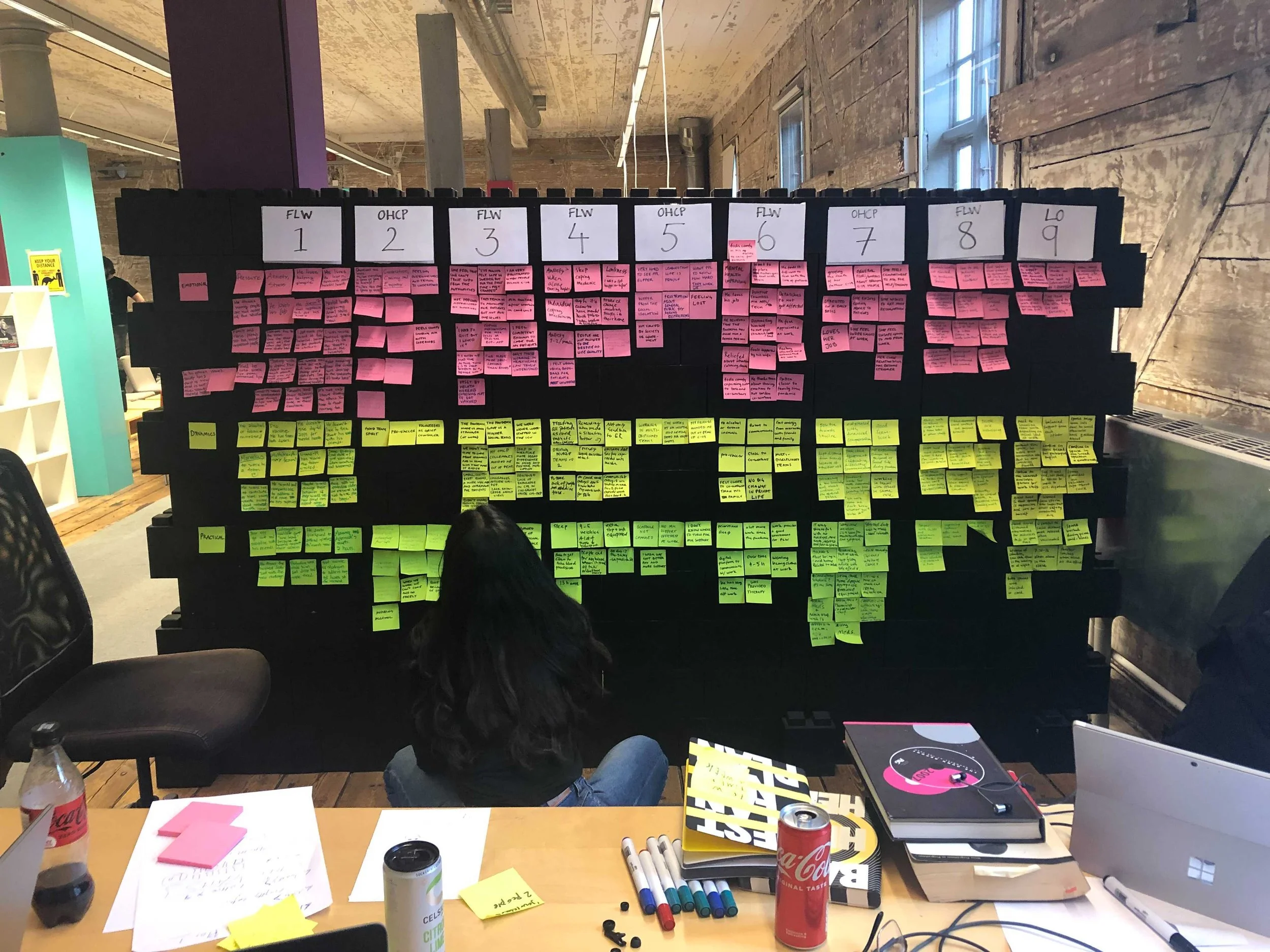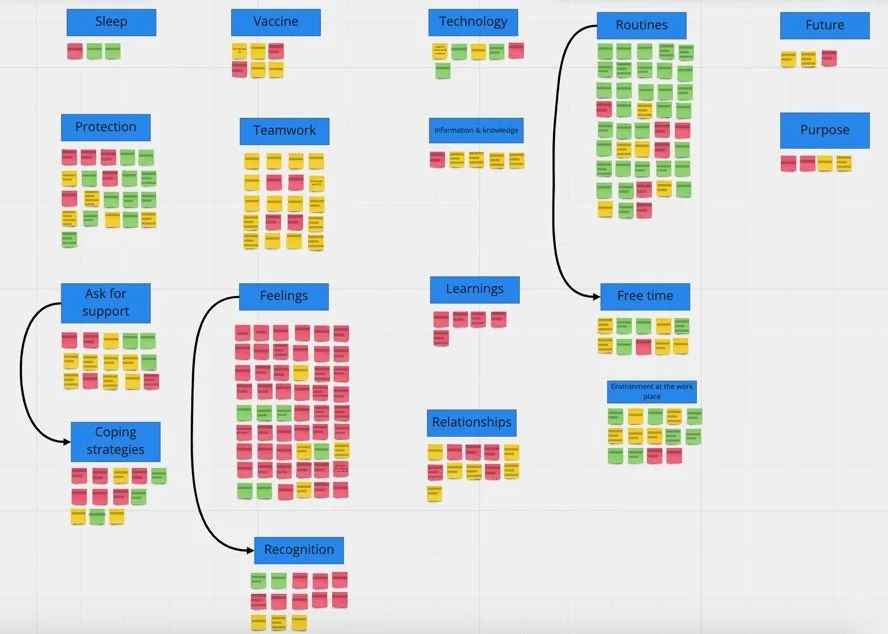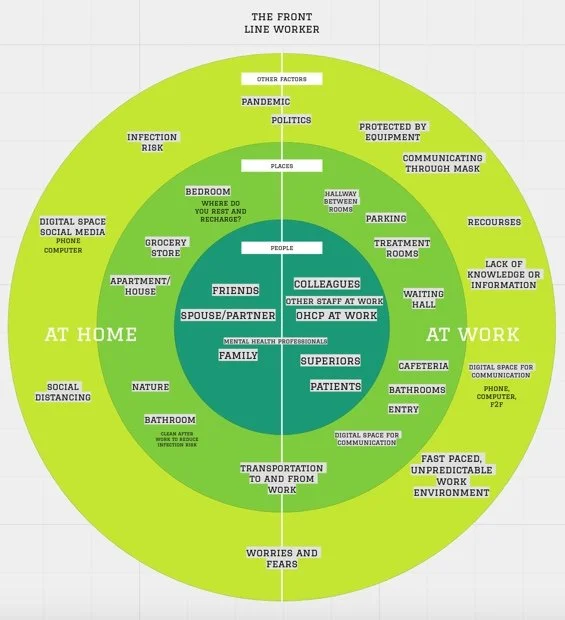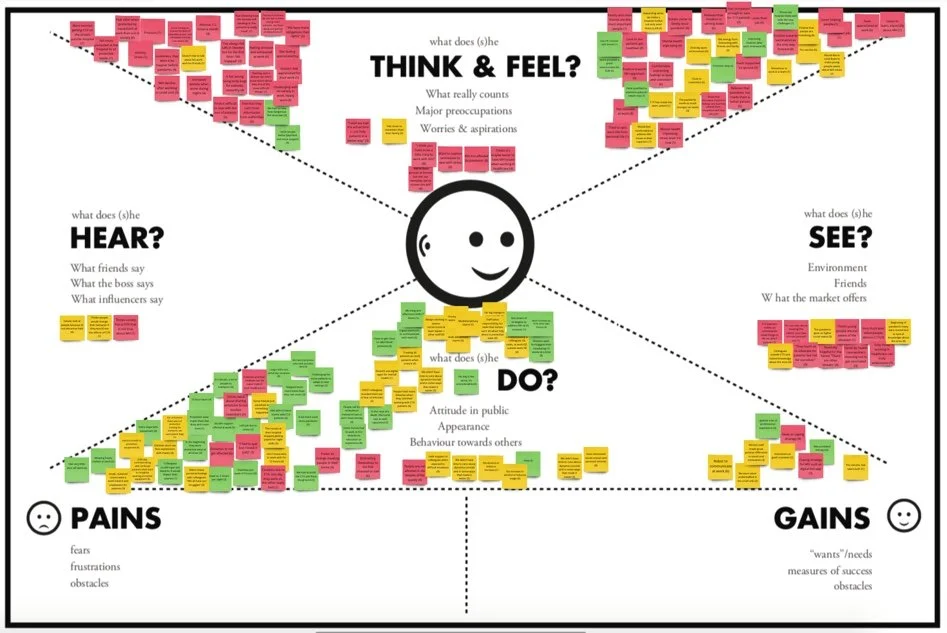User Research Project
Empathy Upgrade
Collaborative project
Project Description: User Research project in which our goal was to discover how the Covid-19 pandemic has affected frontline workers’ mental health. Whilst, creating a concept idea based on the pain points of our target group .
Project duration: 4 weeks in 2021
Team: In collaboration with Caroline Lindh, Jack Sandberg, Maria Östgren, and Yasmine Makki.
My role: UX researcher.
Society depends on the expertise of frontline workers;
how has the pandemic affected their mental health negatively,
in all probability impeding their ability to work?
The COVID-19 pandemic and subsequent quarantines and lockdowns have affected the entire world and its population. One of the specific populations under concern is first respondents and frontline workers who have been under exceptional stress, being faced with extreme workloads, difficult decisions, risks of becoming infected and spreading the infection to families and communities, and also witnessing deaths of patients.
*for this research we define pandemic as the time period from march 2020 - march 2021.
“The need to support the mental health of frontline staff during COVID-19 has been recognised [8]. However, this pandemic has also highlighted a paucity of research on the mental health needs of frontline health and social care workers, and a lack of evidence-based guidance about what psychosocial support might be most effective in helping them.”
Starting with secondary research, we wanted to gather information to understand the overall situation of frontline workers. Also, we included previous research, as an example this research article from Plos One.
What support do frontline workers want?
The objectives
In parallel with secondary research, we started writing our research objectives. We concluded that in order to understand potential reasons for the negative impact on the mental health of frontline workers during the pandemic we would like to learn and explore different areas of their lives.
Understanding the problem & developing our research plan 🔎
Surveys + User interviews
Primary Research
Applying visual frameworks to develop empathy and get a wider understanding of the people involved.
Synthesising
Both the survey and interviews we carried out, were divided into three categories: emotions, dynamics, and practical. Our intention was to learn about frontline workers’ pain points in general and to make sure to cover as much of their lives as possible. Unfortunately, we didn’t have enough responses to our survey. Due to time constraints, we decided to focus on the interviews and use the data from the survey as support. I’ve conducted 4 out of the 9 interviews that our team did. Some of our questions for frontline workers were:
What have been the biggest challenges for you during the pandemic?
How would you describe your current mental health?
Are you comfortable addressing your mental health concerns with your superiors if you feel the need?
How do you feel about frontline workers who worry that they burden their colleagues by confiding in them?
How do you feel about how the media covers frontline workers?
How has the pandemic affected your schedule?
Our next step was to cluster, and find patterns regarding all the gathered information. As well as applying two frameworks: empathy and stakeholder mapping. The emotional mapping showed that there are plenty of negative aspects that don't serve their mental health – and a lot of insight into what their needs are, but not much action due to stress factors. A bad cycle of stress builds on itself. Whilst looking at the routine and places the person interacts with it becomes clear there’s not much opportunity for recharging. In interviews, many witnessed they don’t really talk with their colleagues about the emotional load of working with disease and loss, and there’s not much spare time to rest and recharge at home.
The problem
Secondary Research
Worldwide 🌎
02
Explore how the pandemic affected social dynamics between frontline workers and the rest of their healthcare colleagues.
03
04
How has the pandemic affected frontline workers’ perception of the general population (non-healthcare workers)?
What could be the potential solutions to improve mental health wellness amongst frontline workers?
Minimum age 18+
Male and Female.
Frontline workers
Healthcare professionals
Individuals who have a personal relationship with FLW
01
We are interested in learning about the social life and interpersonal relationships of the frontline workers during the pandemic (family, significant others, social networks, friends)
Synthesising our findings into key insights 💡
The stress load of frontline workers during the pandemic depends on people falling sick. We wanted to find a question that could help us close the gap between people being careless about the risks because it doesn’t directly affect them, and taking action because of the actual risks of spreading the virus.
How might we bring the emotional experience of the virus into the public space, so that there is a greater understanding of the virus and its effects?
Frontline workers expressed feeling frustrated when people in the general public didn’t follow restrictions.
Ideating
The stress load of Frontline workers depends on people falling sick.
During our ideation process, we brainstormed different ideas and decided on moving forward with a solution that would target the problem itself.
The concept idea
Takeaways + What I would do differently
To design with empathy, I need to consider research ethics. While working on this project, I became aware of how important ethics are when conducting research, specially when addressing sensitive topics such as mental health.
Regarding surveys, I would make it not possible to skip screening questions and ask the same questions to all target groups to be able to compare their answers.
As my first research project, it was incredibly valuable to me. I was able to learn how to build a research plan from scratch, when and how to apply different research methods, as well as how to synthesize data into meaningful insights.
Empathy Upgrade for Google Maps
Mobile function
User accept update
User toggle on the empathy button
User have the opportunity to navigate without coming in contact with large crowds
Alternative usage
Live update on digital screens that indicates the movement and density of crowds
Tracking either through maps or heat recognition
During the pandemic, there was a big focus on making sure there was enough staff at the hospitals but no plan to handle frontline workers’ emotional needs.
Frontline workers feel appreciated by individuals but not by society as a whole.
Key Quotes from Interviews
“Related to Covid-19, some people didn’t follow the recommendations because they didn’t know someone close to them”
“We are thought to advocate for patients but not for ourselves. I left my job due to stress”
“I would like people to know how hard we work”
“It’s frustrating to see the general public dismissing the restrictions”
“I was more worried getting Covid-19 on the stress, outside the hospital”















